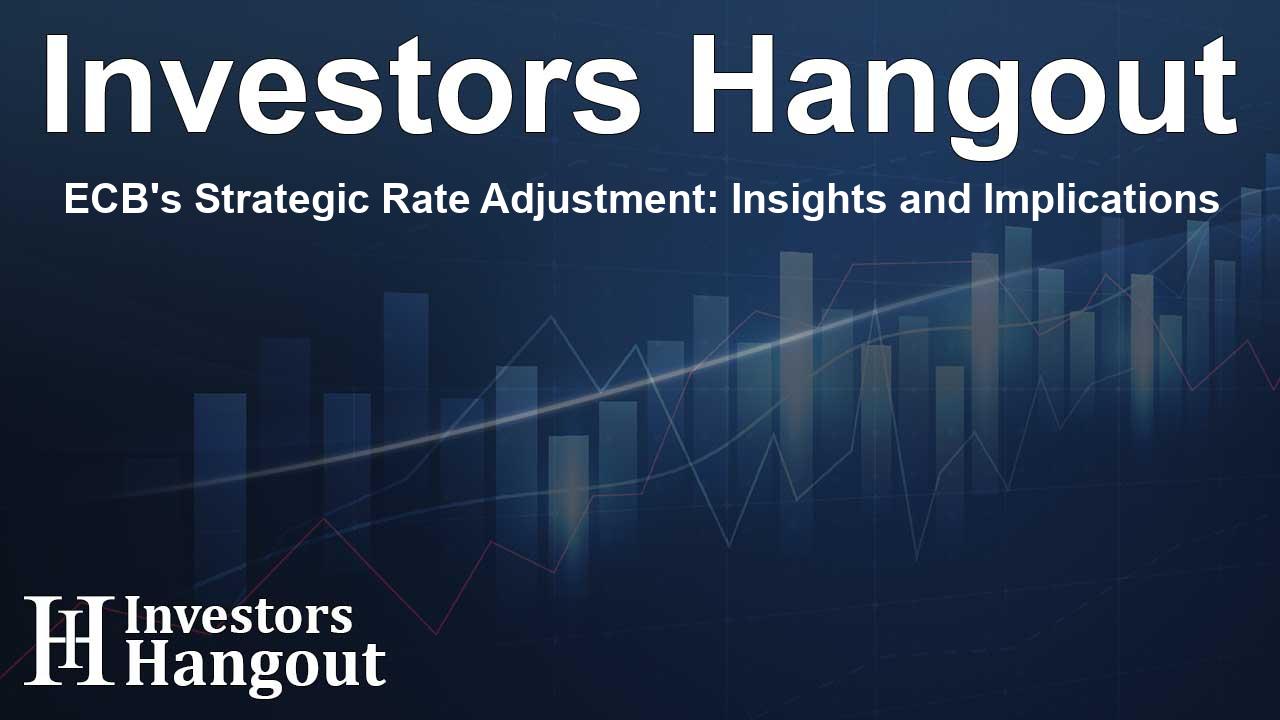ECB's Strategic Rate Adjustment: Insights and Implications

ECB's Recent Policy Meeting Overview
In a significant move, the European Central Bank (ECB) announced its decision to lower the deposit facility rate by 25 basis points during a recent policy meeting. This adjustment reflects an evolving strategy aimed at addressing the dynamics of the economy and inflation.
Analysis of Inflation Dynamics
According to the Governing Council, the current assessment of inflation and underlying economic conditions warranted this reduction in the interest rate. With key measures of inflation aligning with projections, the ECB is actively steering monetary policy to ensure economic stability.
Insights on Inflation Projections
The ECB staff suggests that headline inflation is expected to average 2.5% in the upcoming year, followed by 2.2% in the subsequent year, and a gradual decline to 1.9% by 2026. Observations highlight that inflation may see a rise towards the year's end, driven by earlier reductions in energy prices falling from annual calculations.
Core Inflation and Economic Growth Outlook
As the outlook for core inflation shows slight upward revisions for 2024 and 2025, the dynamics continue to reveal complex patterns in services sectors, illustrating how sensitive economic factors interact. Anticipated labor cost trends indicate a moderation, while the domestic inflationary environment also puts pressure on wages and profits.
Economic Growth Figures
Economic projections hint at growth rates of 0.8% in the coming year, with a suggested rise to 1.3% in 2025 and further advancing to 1.5% in 2026. However, compared to prior estimates, this represents a slight downturn influenced by weaker domestic consumption and investment patterns.
Commitment to Inflation Targets
The Governing Council’s pledge remains firm: to achieve a steadfast return to the 2% inflation target. As such, they have decided to maintain policy rates at levels that are appropriately restrictive until the intended results are reached.
Data-Driven Policy Adjustments
The process to determine the appropriate monetary stance will continue to be data-dependent. Each decision made concerning interest rates will be informed by ongoing economic developments, ensuring the ECB's mechanisms and responses are both timely and effective.
Operational Framework Changes
From mid-September 2024, a noteworthy operational shift is set to occur where the spread between refinancing operation rates and the deposit facility rate will be adjusted to 15 basis points. This marks a strategic shift in how the ECB handles operational funds and manages market expectations.
Asset Purchase Program Insights
The ECB is gradually diminishing its asset purchase program portfolio as principal payments from maturing assets are no longer reinvested. Moreover, the Pandemic Emergency Purchase Programme (PEPP) will also see a reduction as the monthly disbursement decreases by approximately €7.5 billion.
Refinancing Operations and Financial Stability
In light of the ongoing repayment by banks under targeted longer-term refinancing operations, the ECB Governing Council will continue to assess these measures' alignment with its monetary policy goals. Ensuring a smooth monetary policy transmission framework remains imperative for achieving desired inflation targets.
Preserving Market Integrity
The Transmission Protection Instrument stands as a safeguard against unwarranted market fluctuations that could disrupt effective transmission across the euro area. With economic stability as a priority, the ECB is committed to a robust monetary policy implementation to uphold price stability.
Frequently Asked Questions
What was the main decision made by the ECB in its recent meeting?
The main decision was to lower the deposit facility rate by 25 basis points as part of its monetary policy strategy.
How does the ECB's policy impact inflation rates?
By adjusting rates, the ECB aims to moderate inflation, targeting a return to a 2% medium-term goal through its monetary policy maneuvers.
What are the projected inflation rates for the coming years?
Headlines inflation is anticipated to average 2.5% in 2024, decreasing slightly in the subsequent years.
What economic growth is expected in the near future?
The forecasts suggest economic growth of 0.8% in 2024, potentially increasing to 1.5% by 2026.
How will the ECB respond to changing economic conditions?
The ECB is committed to a data-driven approach, adjusting its policies as necessary based on evolving economic and financial data.
About Investors Hangout
Investors Hangout is a leading online stock forum for financial discussion and learning, offering a wide range of free tools and resources. It draws in traders of all levels, who exchange market knowledge, investigate trading tactics, and keep an eye on industry developments in real time. Featuring financial articles, stock message boards, quotes, charts, company profiles, and live news updates. Through cooperative learning and a wealth of informational resources, it helps users from novices creating their first portfolios to experts honing their techniques. Join Investors Hangout today: https://investorshangout.com/
Disclaimer: The content of this article is solely for general informational purposes only; it does not represent legal, financial, or investment advice. Investors Hangout does not offer financial advice; the author is not a licensed financial advisor. Consult a qualified advisor before making any financial or investment decisions based on this article. The author's interpretation of publicly available data shapes the opinions presented here; as a result, they should not be taken as advice to purchase, sell, or hold any securities mentioned or any other investments. The author does not guarantee the accuracy, completeness, or timeliness of any material, providing it "as is." Information and market conditions may change; past performance is not indicative of future outcomes. If any of the material offered here is inaccurate, please contact us for corrections.